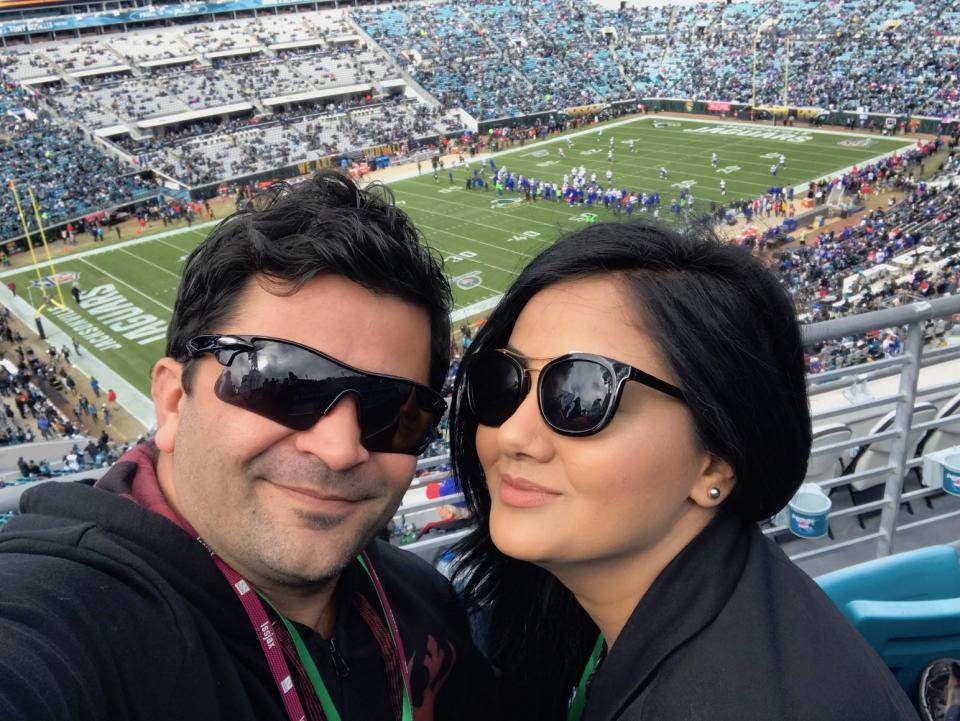Jags owner’s ticket offer leads to unforgettable day of football for this Iraqi refugee
JACKSONVILLE, Fla. – For many years, Ayad Shamsaldin risked his life on a daily basis for a country he had never visited.
He was born in Iraq and he went to high school in Mosul. He learned English and became an interpreter. He knew the challenges the United States military was having in his country, and he wanted to help.
“I kept hearing and seeing there were a lot of incidents when things went very badly because there was a language barrier,” said Shamsaldin, 29. “That shouldn’t have happened. We could use our skill to prevent that from happening.”

For years he worked with the U.S. Army. For years his life was in danger.
“I’d look outside a window of our vehicle and every civilian vehicle that passed by, I thought, ‘OK this is the one, this is the one that will blow up,’” he said. “And every one that passes, it was like I was reborn.”
Shamsaldin has been reborn since, in other ways. He applied for and received a special immigrant visa (SIV) and came to the U.S. in 2013. He met another refugee, an Afghan woman named Rana, and they married. And on Sunday, they went to their first football game, courtesy of Jacksonville Jaguars team owner Shad Khan.
The billionaire was once a newcomer to this country as well, arriving at age 16 from Pakistan and washing dishes for $1.20 an hour. Last week he offered 1,000 tickets to local refugees from around the world and also evacuees from last year’s hurricanes. Khan paid for transportation, food and merchandise. Shamsaldin and his wife boarded a school bus at 10 a.m. Sunday and had no idea what to expect.
“I really appreciate what Shad Khan did,” he said, “not just for us but for everyone. It’s my first time ever in a football stadium.”
The Jags worked with the Lutheran Social Services of Northeast Florida, which resettles several hundred refugees every year. Mary Strickland oversees the program, which includes finding the refugees jobs, housing and a community of new friends. She hired Shamsaldin to help her run operations.
“The refugee influx usually follows the wars,” she said. “There used to be a bunch of Bosnian people. Lately there have been Burmese people. Last year, a lot of Syrians. Now they’re banned.”
Strickland says the number of people coming has dropped measurably under the Trump administration.
The misconceptions about refugees are vast. They almost invariably turn into positive contributors to the community. “Refugees are easy to place,” Strickland said. “They will happily work for $10.50 an hour at an Amazon fulfillment center, or as an Uber driver.”
And they are not pilfering goods and services. After a short time in this country, Strickland said, they get a bill from the U.S. government. They have to pay back the federal money used to help resettle them.
“This is not the same as refugees in Europe,” Strickland said. “They’re not crossing the border. They’re not here illegally. They are carefully vetted or managed. This is very different than what you hear about” in Europe.
The reactions of the refugees upon arriving in the U.S. are always memorable. Most have never seen a car seat, and struggle to place their babies into one. Some open their new fridge, which Strickland and her colleagues have stocked with food, and remark they haven’t seen eggs in years. Some have never experienced running water. One told her she had never slept in a bed before.
So you can imagine the wonder Shamsaldin felt as he entered EverBank Field and looked at 70,000 people from his perch in Section 442. He was part of the local community in a whole new way. “Insane,” he said.
There is still plenty of sadness in his life. Most of his family is still in the Kurdish region, trying to come to the U.S. but so far “in limbo.” They applied several years ago but “we don’t know if they’ll ever show up.” His future is bright but theirs may not be.
For an unforgettable day, however, he was far away from the daily fears of his former life, taking in one of the truest American traditions. Shamsaldin hopes to gain citizenship sometime in 2018, but in his heart he’s still a newcomer.
“I’ll always be an immigrant refugee,” he says. “That’s what got us here. That’s what makes our country so special.”

